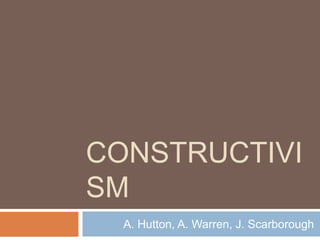
Module 13 Learning Theories
- 1. CONSTRUCTIVI SM A. Hutton, A. Warren, J. Scarborough
- 2. Constructivism Five Tenets of Constructivism THE CONSTRUCTI • How might students entry points be identified? VE THEORY IS BASED • What is involved in structuring the experiences UPON THE that will build bridges from present understanding to new understanding? IDEA THAT THE • How might the selection of projects pose LEARNER questions that relate to students' real-life “CONSTRUCT experiences? S” WHAT IT IS • What are the major concepts that students THEY should understand? UNDERSTAN • How might we move from right/wrong to D. monitoring students' understanding?
- 3. Key People: Jean Piaget Piaget was a Swiss psychologist who studied human development in the 20s. Dewey introduced Constructivism, but Piaget further developed it. Piaget stated that children have a holistic approach to learning, focusing on the various channels such as reading, writing, listening, etc. Children go through four stages of learning: Birth to age 2: sensorimotor, or using both sensory and motor skills to explore things Age 2 to age 7: preoperational, or using symbols and responding to things as they see them Age 7 to age 11: concrete operational, or beginning to think logically Age 11 to age 14: formal operational, or beginning to think about thinking with abstract and systematic thinking. The learner is then advanced through three mechanisms: assimilation,
- 4. Key People: Jerome Bruner Bruner was an American psychologist who believed that learning is an active process in which the learner constructs new ideas or concepts based on his current or past knowledge; learn by participation. He developed the framework for cognition, in which students learn by building on past knowledge, changing and shaping what they already know to fit the new information. Bruner also encouraged spiral curriculum and organization of curriculum that allows students to build on what they've already learned. The Socratic Method was developed by Bruner as well. Using this, teachers engage students which forces them to answer their own questions by thinking critically, discussing, and finding ways to back up their findings.
- 5. Key People: Lev Vygotsky Lev Vygotsky was a Russian educational psychologist who focused on child cognitive development. He created many theories and concepts on learning. Social Cognition learning is significantly impacted by social development. Learning takes place in a child's social development and culture. Socializing ultimately produces consciousness and cognition. Zone of Proximal Development refers to the difference between a child's ability to solve problems and his potential to learn from an older or more advanced person, such as a teacher. Collaborative Learning puts emphasis on close instruction between a student and a teacher, or students together. This gives support for group projects, so that students can bounce ideas off of each other to learn and understand better than they can on their own. Scaffolding is helpful when learning takes place in a social setting. New information builds a scaffold for the student to work with so that he can develop his own set of knowledge based off of the information that has been presented to him.
- 6. Key People: John Dewey John Dewey was not only an American educational psychologist, but a philosopher, and activist for instruction centered around the child. His beliefs were similar to Vygotsky in that he thought education should be a social process. Dewey was a forward thinking man whose ideas on education favored well rounded, practical education. Progressive education was a movement Dewey took great part in. It emphasized teaching children not facts, but educating them physically, and socially as well. Pragmatism was another movement Dewey has been linked to. It stressed that theories are only valuable for their practical applications. Many progressive American schools were founded by John Dewey.
- 7. Classroom Implications on Constructivism What the Teacher Does What the Students Do Behave interactively, Work in groups mediating the student’s interactions Are encouraged to ask Seek the student's point of questions view rather than the correct Students become more answer actively engaged with Teachers in constructivist technology than in a normal classrooms with technology can let students learn classroom setting and can different things at the same learn different things at the time, increasing the zone of same time. proximal development.
- 8. What We Think About Constructivism As far as teaching in my own classroom, it's important as an English Language Arts teacher to allow your students to ask questions and mention their own points of view. Having a constructivist classroom increases their willingness to do so, therefore making the lesson more effective and interesting for all. Constructivism also plays on parts of the student's minds that may not have been used as effectively before. Not only does this make for more interesting discussions, but it also opens up new areas of their mind that can be used in future learning. I definitely plan to use constructivism in some way in my classroom. - A. Hutton I became interested in teaching This is a perfect way of teaching in because I wanted to inspire thought my own classroom, because it within my students. With some of demands my students' attention and the theories of constructivism I can they cannot help but learn something get my students to actively because they are actively pursuing participate and use their minds. answers. -A. Warren - J. Scarborough
- 9. Credits Shelly, Gary, Glenda Gunter, and Randolph Gunter. Integrating Technology and Digital Media in the Classroom. Sixth Edition. Boston: Course Technology, 2010. 376-382. Print. "Constructivism Theorists." The San Francisco State University.N.p., n.d. Web. 21 Nov 2011. <http://userwww.sfsu.edu/~foreman/itec800/finalprojects /eitankaplan/pages/theorists.htm Photographs retrieved from Google: http://webspace.ship.edu/cgboer/piaget.html http://www.phillwebb.net/topics/human/Bruner/Bruner. htm http://01.edu- cdn.com/files/static/g/pcl_0001_0002_0_img0146.jpg http://dewey.pragmatism.org/dewey.gif